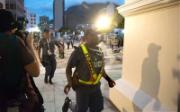
NOT for the first time, those who are most anxious about freedom’s future here probably have the least reason to worry.
According to some of our media, the events at last week’s state of the nation address again ignited a familiar suburban fear — the supposedly inevitable day when majority rule plunges us into a dictatorship. Investors, we are told, will now flee and the beginning of the end for people in the suburbs is upon us. But, as appalling as events in Parliament were, they are unlikely to affect the economy or the lives of those who harbour these fears.
What happened in Parliament was not unique — if societies were doomed when their political classes behaved badly, no country on the planet would survive. Countries whose parliaments have descended into chaos recently as MPs brawled include Italy, Turkey and South Korea. Spain’s parliament was the site of an attempted coup. In all, investment continued, as did normal life. We are no different. Levels of investment here — and the state of our economy — depend on many factors: the way politicians behave towards each other is rarely, if ever, one of them.
We are also no more polarised a society than we were before these events. Media commentators who bewail the shattering of our democratic bliss are simply showing how out of touch some of us get if we speak only to people like us: in the real SA, which these commentators ignore, division and intolerance are still daily realities. But, as damaging as they are, they will not tear the society apart because it lives too easily with intolerance and division as long as the suburbs are largely exempt.
And, contrary to much of this commentary, the suburbs will remain exempt.
A credible reason for worrying about the events in Parliament is that they show an increasing willingness to strong-arm government opponents — jamming signals and sending armed men to remove entire political parties seems part of a growing use by the authorities of security measures to "solve" political problems. Only last week, police halted a Johannesburg march protesting against attacks on African foreigners.
But all of this is aimed at very specific targets. The problem in Parliament is not that the government has grown tired of opposition — it is that it has become a venue for a feud in the African National Congress (ANC) family between the Economic Freedom Fighters (EFF) and the ANC. Why see this as a family fight? Because most EFF politicians would still be in the ANC if its leadership had not pushed them out — the only exceptions are a black consciousness grouping that is seemingly on the verge of being driven out of the EFF in much the same way as its leaders were ejected by the ANC. Nor, despite indignant denials, is there any guarantee that many of the EFF figures will remain outside the ANC forever. Despite the alliance of EFF politicians, media and commentators determined to present it as something new in our politics, there are no great differences now between it and the ANC: their fight is about who should pay back money to whom and how far the EFF should be allowed to go in seeking media attention. As often happens, the closer the antagonists, the more bitter the fight.
The problem is heightened by the ANC’s image of itself. There is much in its world view that has helped to sustain democracy: its nonracialism and its relative tolerance of internal difference. But it also tends to see itself as the sole representative of the black majority and its aspirations — to be disloyal to the ANC is thus to betray the people. This in itself would make the EFF an affront. When those who break away spend most of their time picking a fight with the ANC, the temptation to hit back becomes overwhelming.
But the fight is meant to stay within the family. This is why the same presiding officers in Parliament who drove the EFF out wanted the Democratic Alliance to stay — and why some ANC politicians are now vilifying the EFF but none of the other parties, which have shown no disloyalty to the family as they are not part of it.
Parliament is not the only place where security methods hold greater sway. But the weapons, real and figurative, are not trained on the suburbs — they are reserved for immigrants’ rights activists or social movements in townships and shack settlements. They are meant only for presumed members of the family who threaten the ANC’s claim to speak for it.
Much of what happened in Parliament last week may not happen again — jamming signals and strong-arming MPs offends too many people with whom the ANC has no quarrel. Life in the suburbs will continue as normal, punctuated only by complaints about load-shedding.
But those in the ANC family who threaten it may not be so lucky. The feud with the EFF will not abate soon; grass-roots activists will remain a target. The test for those who were wringing their hands last week is whether what happened pricked their bubble enough to get them to care.
By Steven Friedman
Source: Business Day
Police enter the Parliament building in Cape Town during President Jacob Zuma's state of the nation address on Thursday. Picture: TREVOR SAMSON
Friedman is director of the Centre for the Study of Democracy.
